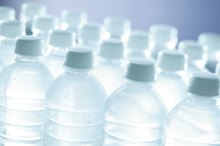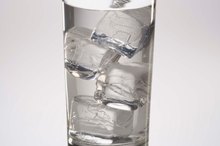Nutritional Value of Diet Tonic Water
Tonic water is a nonalcoholic beverage that contains filtered water, carbon dioxide, minerals and quinine. Manufacturers add carbonation to the water to create the fizz that characterizes tonic water and club soda. The presence of quinine requires sugar and flavorings to moderate its bitter taste. Added sugar causes regular tonic water to have as many calories as the average canned soda, according to the Centers for Disease Control and Prevention. Diet versions of tonic water have far fewer calories. Whether you drink tonic water as a mixer with alcoholic drinks or for the crisp flavor and bubbles, neither version provides any significant nutrients. The main benefit that you get is rehydration from drinking water.
Calories
The calories in diet tonic water depend on the brand. Comparing two national brands, Schweppes and Seagram's, provides a calorie average. Seagram's diet tonic water has 3 calories per 8-ounce serving, according to website Food Picker. The Schweppes diet version of tonic water has no calories, according to the company's website. Compared with regular tonic water, you save 82 calories with Schweppes or 79 with Seagram's.
Sodium
Diet Tonic Water Vs. Regular Tonic Water
Learn More
The sodium content of tonic water varies by manufacturer. The Schweppes brand contains 65 mg of sodium per 8-ounce serving. Seagram's 8-ounce serving of tonic water has 32 milligrams of sodium.
Nutrients
Although tonic water does not provide any nutrients at significant levels, it does contain trace amounts of minerals, according to the U.S. Department of Agriculture. The minerals present in tonic water are calcium, copper, fluoride, iron, manganese and zinc. The U.S. Food and Drug Administration rates foods and beverages that provide less than 5 percent of the daily value of any nutrient as poor sources. None of these minerals provides at least 5 percent of the DV.
Tonic Water Alternatives
Gatorade G2 Ingredients
Learn More
The ingredients in tonic water often include citric acid, sodium citrate, sodium benzoate, quinine and flavoring agents, along with the water. Diet versions also contain an artificial sweetener, such as aspartame or saccharin. For a zero-calorie carbonated drink with no additional ingredients, you can substitute plain carbonated water for diet tonic water when preparing most mixed drinks. For hydration, carbonated or plain water with a spritz of lemon eliminates both calories and unnecessary sodium.
Related Articles
References
Writer Bio
Carol Luther has more than 25 years of business, technology, and freelance writing experience. She has held leadership roles in higher education management, international development, adult education, vocational education, and small business support programs









